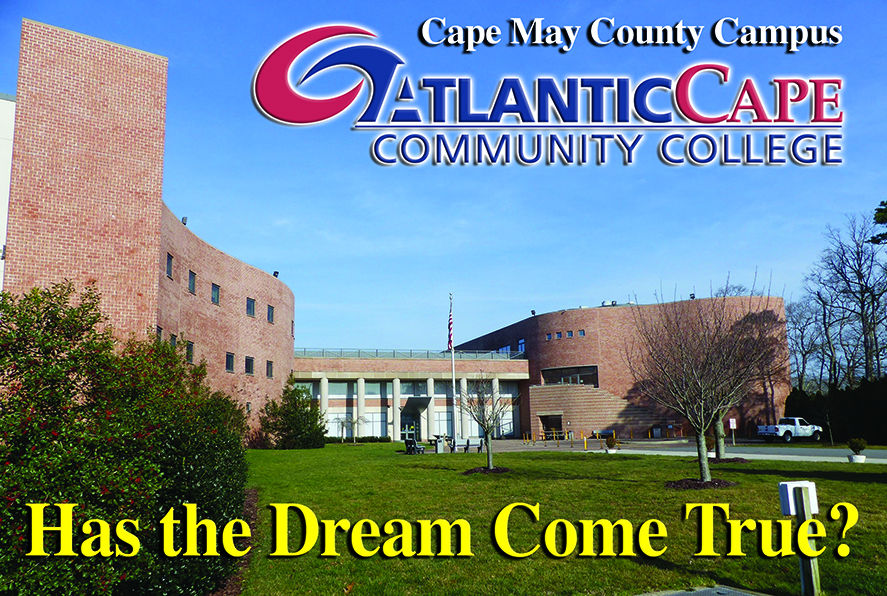Has the dream come true? That was the question asked in the Herald’s six-part series on Atlantic Cape Community College. In the view of the Cape Issues committee, the answer is, No. The picture and next steps:
A New Jersey manual for new community college trustees says that the state “embraced the principle of comprehensive community colleges,” referring to three related goals that should be part of any New Jersey community college mission: preparing students to enter four year institutions, training students to assume skilled positions in the state’s workforce, and offering programs that enrich the quality of life for county residents. Frankly, we have seen little evidence of these priorities.
The record of success in Cape May County is just not there.
We have not experienced growing educational opportunity. In fact, enrollments at our campus are now at levels reminiscent of county enrollments prior to the building of the Court House campus ten years ago.
We have not seen expanded workforce development efforts or a prominent role played by Atlantic Cape in the county’s economy. The actions on economic development have been reactive, concentrating on training programs paid for by local companies. The Herald series quoted President Dr. Peter Mora’s response when asked about workforce initiatives: “If a business there calls us we respond.”
We have not seen Atlantic Cape’s campus in our county become a center of intellectual and cultural life for county residents.
Most of all, the campus has not had leadership that focused its energies and resources on the unique needs of Cape May County.
The most recent Annual Budget Message issued by Mora acknowledges “a continued decline in enrollments” in the two county service area. He projects that this decline has not hit bottom. Mora locates its causes in population decline, a downturn in high school graduating classes, and “economic conditions in our service area.”
Yet relevance may be more to the point than demographics. Atlantic Cape’s financial reports show that the demographic declines in the service area have not paralleled the magnitude of the enrollment loss. In 2014 high school graduation cohorts were very similar to what they were at the peak of Atlantic Cape’s enrollment in 2010. The downward trend is real, but the numbers do not suggest that it accounts for the 20% loss in overall enrollments, or the 28% decline seen in our county, both of which were experienced by Atlantic Cape between 2010 and 2015.
We agree that a number of factors impede healthy growth in both counties. Yet these are challenges to be faced. They do not have to define a future that lacks the elements of success. A community college has a critical role to play in the process.
We note certain announcements made by Atlantic Cape during and immediately following the Herald series.
This fall will see a return of degree programs to the Cape May County campus. At its inception the campus offered eight full degree programs which could be completed in classrooms in Court House. The Herald series showed that the number had dropped to two programs over the decade since the campus opened. Now a new attempt is underway to offer access to nine programs, all but two through the use of teleconferencing, where students will join a class in which the faculty member will most often, but not always, be in Mays Landing. It is a worthy effort, but it comes years after all enrollment gains at the campus have been lost. Over that time academic programs with a career focus left our county.
Even with the teleconferenced classes, we must ask about the focus on this county’s needs. A county heavily dependent on small business has no entrepreneurial studies program. A county where tourism is the life blood of the economy has no hospitality program locally. The Herald series showed that Dr. Richard Perniciaro, a vice president at Atlantic Cape, admitted that there has been no program strategy specific to Cape May County.
We also noted that a recent meeting of the college trustees approved the appointment of deans for campuses in Cape May County and Atlantic City. The lack of a senior leader whose focus is the success of the college in Cape May County was shown to be a significant problem in the Herald series. The appointment by the Trustees of Dr. Levy as Dean, Cape May County campus, does little to alleviate our concerns. Levy will still remain the college’s Vice President for Student Affairs; the job that we suspect will command most of his attention. He has had oversight over the campus, which reported to him, since he started at Atlantic Cape. Levy has no special connections to or experience of Cape May County. There is little to suggest that the recent move will bring knowledgeable and dedicated focus to our county’s needs.
What the Herald series showed was that Cape May County did not get a comprehensive community college ten years ago. It got a satellite campus of a community college whose focus was always Atlantic County. It got a $15 million dollar building in Court House to serve as an extension center not functionally different from what existed before the new campus opened. We have long been a junior partner in a relationship in which attention is largely on Atlantic County.
Based on our review, we believe the following steps need to be taken to ensure the Cape May County campus is a viable institution that is focused on the needs of Cape May County.
- What we need is focus on our county and its needs. Our environment requires innovation to meet the challenges that impede success. In Cape May County that will probably require greater integration of educational resources, links with the county technical school making use of its resources for culinary arts or hotel management, or building viable programs for a linked system of vocational-technical education.
- We need academic programs relevant to county residents and a renewed focus on both the traditional high school graduate and the older student. Atlantic Cape has placed the burden of decline on the demographics of the high school population but has demonstrated no comprehensive recruitment strategy for the non-traditional age student that often represents a large segment of a typical community college.
- We need a higher education institution that works hard to align entry-level college courses to requirements for the high school diploma. We need to concentrate on a strategy that makes all of our high school graduates ready for entrance to introductory college courses.
- We need a community college that is a center for learning and the development of new skills for our seniors. Retired individuals with time and resources say the Atlantic Cape campus has no interest for them. We believe the senior market has never been developed here. This area would become a more attractive retirement community if there were lifelong learning opportunities like those stressed at nearby West Chester, for example, where Widener University has an institute devoted to intellectual and cultural programs for mature adults.
- We need an incoming president for Atlantic Cape who realizes that he or she has two counties to serve and that each has their own character and needs, both deserving of dedicated focus and attention. We need the trustee search committee to ensure that the selection process places proper emphasis on a candidate’s ability to lead an institution that truly serves two counties.
- We need a senior Atlantic Cape official on site and responsible only for the Cape May County campus full time, not someone with another full time assignment.
- We need our county Freeholders to step in and provide the oversight required to make our joint arrangement something that truly serves our county and its residents. The Freeholders need to make clear their expectations for the campus. This must not become an experience like that with the Workforce Investment Board; our county cannot continue to be without a community college which focuses on its needs and aspirations.
The selection of a new leader for Atlantic Cape is coming at a critical time when the institution is facing enormous challenges. We suggest that the Trustees hold a retreat to focus on the goals for the institution going forward and specifically consider the Cape May County campus and its own unique environment. Any such planning process also requires that the Cape May County Freeholders define their priorities in order to guide the development of an effective strategy for this county.
The American Council on Education or the Association of Community Colleges have services that would help guide such a strategic look at the future of the College and the needed characteristics of an ideal candidate at this point in the institution’s life.
We suggest that the Trustees avoid the tendency at Atlantic Cape to quickly hire from within. A strategic review done by the Trustees, even if it impacts the timetable and requires the use of an interim President, is a critical step.
President Mora’s 2017 budget message predicts continued decline in enrollments and revenue. The need for innovative thinking could not be more important.
In our view getting this selection right is critical to Atlantic Cape’s future and to the education of Cape May County residents which will define our future.
About this summary report: The need for an investigation of Atlantic Cape Community College’s first ten years at its new campus grew out of discussions at Cape Issues for the pressing need for economic development in Cape May County, and the role a community college can and should play in that development. After discussions with Cape Issues members, including Dr. Tom Henry, who has extensive national experience in higher education, the Herald and Cape Issues joined with Vince Conti, to investigate and create it. Conti has had a 35-year career in higher education as a teacher and senior administrator. Among other roles, he served as Vice Dean of Arts and Sciences at The University of Pennsylvania and the chief operating officer of the University of Maryland University College. He has also worked extensively with Historically Black Universities and Colleges in the U.S. and with institutions of higher education in Europe and Latin America.
Cape Issues began in March 2008 as a non-partisan group to focus public attention on issues to improve Cape May County.







